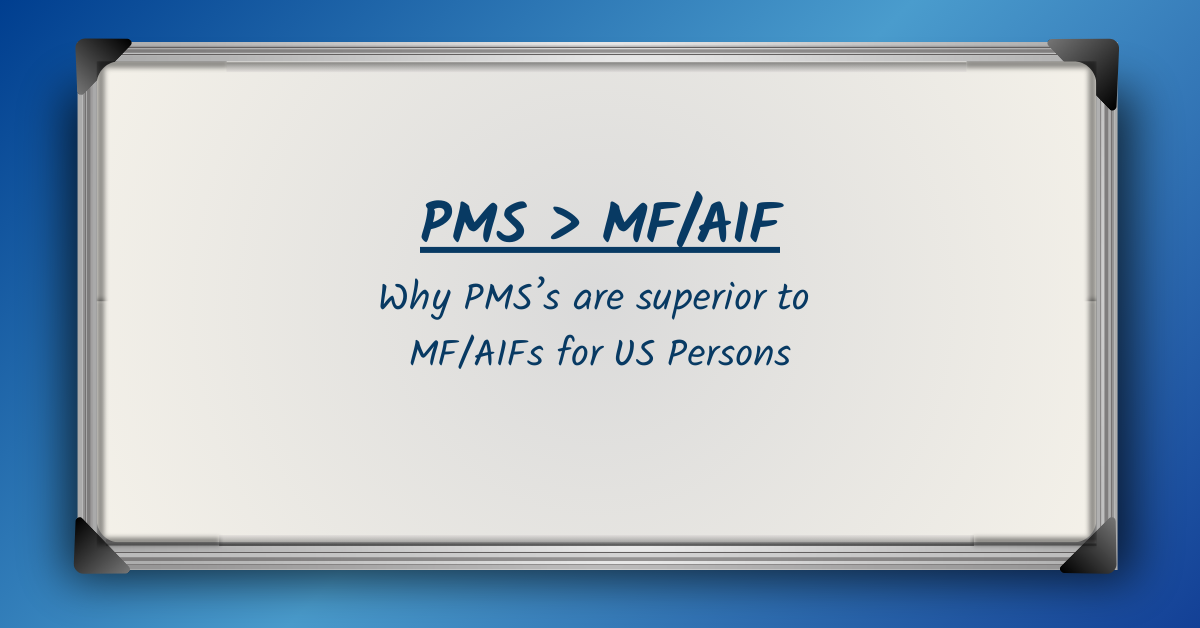
Why US Persons should consider investing in a PMS, instead of a MF or AIF (due to PFIC taxation)?
Taxation of global investments for US Persons can be complicated, especially in the case of pooled investment vehicles (such as Mutual Funds or Alternative Investment Funds - AIF's). In this blog post, we share the US Tax Complications related to pooled Indian investment options and why we believe that US persons should consider investing via a non-pooled investment option (such as PMS - Portfolio Management Services instead).
Indian MF & AIF Investments likely to be considered investments in PFIC's
Unit-based pooled investment vehicles (such as an Indian Mutual Fund or Alternative Investment Fund), are likely to be considered investments in PFIC's (Passive Foreign Investment Company) from a US taxation perspective.
PFIC Investments are not recommended for US Persons
From a US Taxation perspective, investments in PFIC's can be highly tax-inefficient due to the following reasons:
-
Distributions are Taxed at the highest marginal tax-rate: All distributions from PFIC's are taxed at the highest US marginal tax-rates, and not at the investors marginal tax-rate OR the more favourable long-term capital gains tax rate.
-
Excess Distributions can earn expensive penalty interests for late-payment: In the case of Indian MF/AIF's, distributions typically take place on redemptions and are only taxable at the time of redemption. However, the US tax treatment varies. In the case of an investment that has been held for a number of years, any gains made on redemption will be spread equally based on the number of years of investment and tax will be considered payable for these gains in each of the respective years. There will be expensive late-payment interest penalties that will be applicable for such gains that are considered to have been earned in previous years.
-
Mark-to-market Election can help avoid penal interest accumulating: In order to avoid this accumulation of penal interests on excess distributions (notional gains from previous years), it is highly recommended that US persons elect for Mark-to-Market Election (by filing form 8621) in order to compute notional gains on their PFIC investments on an annual basis. This requires an investors tax advisor calculating notional gains on PFIC investments on an annual basis, and paying applicable taxes on the same. While MTM Election can help reduce the impact of accumulating penal interest, there are still a couple of problems - (a) taxation continues to be on the highest marginal tax rate, instead of the investor tax rate or long-term capital gains (b) Filing form 8621 can be very complicated and subject to errors.
PMS Investments will not qualify as PFIC
PMS (Portfolio Management Services) in India are NOT a pooled investment vehicle, since investments in equity/debt securities held in a PMS are held directly in the investors name and the PMS essentially acts as a Power of Attorney to execute trades on behalf of the investor. Since an investment in a PMS is not an investment in a pooled investment vehicle, it would not be considered as a PFIC from a US Taxation perspective (Disclaimer: Please do consult with your US Tax advisors for up-to-date tax advice and on the tax treatments that investments in PMS's will be subject to). Since a PMS investment will be considered similar to an investor having directly purchased the securities in their own demat account, the taxation of gains from these investments will be subject to the form of income (interest, dividend or capital gains). Most of these are likely to be taxed at lower tax-rates than the highest marginal tax-rate applicable to investments in PFIC's.
PMS's help avoid aggressive taxation of investments in PFIC's
Since investments in a PMS will be taxed based on the form of income (interest, dividend or capital gains), the tax rates will be based on substantially lower capital gains tax or the tax slab of the individual investor, as compared to the highest marginal tax rate applicable for investments in PFIC's. Also, the case of accumulating interest penalties on excess distribution and filing of complex 8621 forms do not arise.
Our Recommendation: US Persons should consider PMS's over MF's or AIF's for their Indian Equity Investments
Given the substantial tax-complexities arising out of investments in PFIC's (such as Indian Mutual Funds or Indian AIF's), we recommend that US persons consider investing in Indian equities via the PMS route instead. We anyway typically prefer PMS investments over MF investments, on the back of the longer-term outperformance that we have witnessed in the case of the more differentiated PMS strategies.
Important Disclaimer
IME Capital is not a tax-consultant or a tax-advisor, and specifically is not an expert with regards to US taxation. This blog post has been prepared on the basis of our analysis of various US Tax codes & analysis that we have studied, and may not be up-to-date, factually correct or reflect some of the finer nuances of the applicability of US tax codes on overseas investments by US persons. Please consult your US tax-advisors before making any investments based on the advice of this post.
Experience the benefits of working with a 'research-first' investments firm
Free 15-Day Trial of IME RMS App
Get complimentary access to the revolutionary IME RMS App (direct access to IME's central team insights across 1000's of MFs, PMSs, AIFs & Global funds - a first in the industry).
Additionally, a dedicated private banker will help build your financial plan, investment mandate & undertake a comprehensive portfolio review for free.
